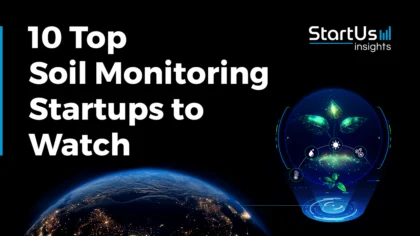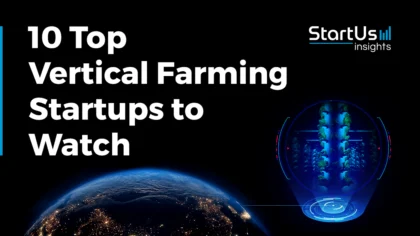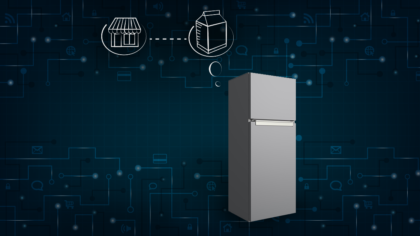Staying ahead of the technology curve means strengthening your competitive advantage. That is why we give you data-driven innovation insights into the agriculture sector. This time, you get to discover 5 hand-picked agricultural field monitoring solutions.
Out of 297, the Global Startup Heat Map highlights 5 Top Agricultural Field Monitoring Solutions
The insights of this data-driven analysis are derived from the Big Data & Artificial Intelligence-powered StartUs Insights Discovery Platform, covering 2 093 000+ startups & scaleups globally. The platform gives you an exhaustive overview of emerging technologies & relevant startups within a specific field in just a few clicks.
The Global Startup Heat Map below reveals the distribution of the 297 exemplary startups & scaleups we analyzed for this research. Further, it highlights 5 AgriTech startups that we hand-picked based on criteria such as founding year, location, funding raised, and more. You get to explore the solutions of these 5 startups & scaleups in this report. For insights on the other 292 agricultural field monitoring solutions, get in touch.
SensaIoTech provides an Environment Monitoring System
Conventional agricultural practices do not utilize real-time environment data to plan daily operations, such as irrigation and fertilizer application, which leads to wastage of resources, including energy and water. Climate change, on the other hand, encourages farmers to cut down their emissions and promote sustainable agriculture. For this, startups develop localized environmental monitoring solutions that enable continuous real-time field monitoring, allowing farmers to optimize resource consumption.
SensaIoTech is a Brazilian startup that develops SMARTFARM, an environment monitoring system. The startup combines data from sensors, satellites, and weather reports to monitor ambient temperature, humidity, pests, and rainfall, among others. SMARTFARM also provides predictions and suggestions based on this data in real-time to facilitate efficient use of resources and equipment. This allows farmers to increase productivity and reduce input consumption as well as practice sustainable cultivation.
Farmote Systems offers a Pasture Monitoring System
Continuous grazing reduces fencing costs and daily management requirements, however, is challenging to control its timing and intensity that leads to overgrazing. On the other hand, rotational grazing systems are efficient for land utilization as well as provide the necessary periods to initiate regrowth and renew carbohydrates in pastures. However, rotational grazing increases the complexity of cattle movement and land management, which is why startups develop solutions to monitor grazing. This allows livestock managers to track cattle movement, as well as paddock conditions, improving grazing management.
New Zealand-based startup Farmote Systems offers a pasture monitoring system for grazing management. The startup installs Motes, its remote monitoring device, at selected locations throughout paddocks to capture pasture measurements and soil condition parameters. It combines this data with satellite-based multispectral images to create digital maps and paddock boundaries. The farm owners and managers receive daily pasture measurements through a mobile-friendly web platform, thereby enabling informed decision-making that improves farm efficiency.
Internet of Things America develops Soil Sensors
Soil health is a critical factor in determining the quality of crop yield. However, soil quality degrades due to the intense use of chemicals and tillage, which causes decay of the soil microbiome and deteriorates its porous nature. This is why startups develop soil health monitoring solutions that allow farmers to mitigate laboratory dependence and generate soil analysis results in real-time. Besides, optimizing agriculture based on soil data further enhances its water holding capacity, thereby, reducing runoffs and soil erosion.
Internet of Things America is a US-based startup that develops soil sensors for vineyards and orchards. The startup’s sensors measure soil moisture and temperature along with the soil’s ability to hold water and nutrients. Further, the startup provides farmers with access to this data through dashboards and provides accurate insights for rainfall and irrigation events. This allows food growers to optimize irrigation and manage cover crops’ water demands, improving yield quality.
Sensefarming advances Field State Analysis
Unsustainable farming practices increase agricultural emissions that further drive climate change. To combat this, farmers adopt precision agriculture techniques to minimize chemical applications and energy consumption. Further, startups even develop novel food production methods that significantly reduce resource consumption, for example, vertical farming. However, all these solutions need continuous field monitoring and analysis to ensure a profitable outcome as they optimize operations based on field conditions.
Sensefarming is a Ukrainian startup that offers end-to-end field state analysis for agricultural applications. The startup uses remote sensing to provide geographic information services (GIS), digital elevation models (DEM), vegetation indices (VI), and digital soil mapping (DSM) for spatial data analysis. In addition, it provides weed detection, field measurement, and flowering detection that speeds up issue identification. Sensefarming also provides recommendations and measures to prevent similar issues in the future, as well as provides farmers with a better understanding of their land topography, soil heterogeneity, and state of crops.
Agremo provides Normalized Difference Vegetation Index (NDVI) Maps
Precision and intensive agriculture increase productivity whereas the methods they adopt are opposite sides of a pole. Intensive farming makes use of massive amounts of chemicals that pollute farm surroundings more than conventional agriculture. This is why farmers now adopt precision agriculture that optimizes the use of all agricultural resources, including chemicals, energy, and water, using real-time field and environment monitoring. Startups develop soil mapping solutions that reduce the operational costs of farms and improve agriculture sustainability.
Serbian startup Agremo facilitates precision agriculture. The startup’s field analytics software for digital agriculture combines aerial data from drones, computer vision, and artificial intelligence (AI) to identify, classify, and quantify spatial-spectral-temporal patterns. The software also supports multiple sensors, such as infrared and multispectral, to create NDVI maps. With this, growers, agronomists, and enterprises track and monitor crop conditions, such as weed and pest levels, plant diseases, and waterlogging, among others.
Discover more AgriTech Startups
AgriTech startups such as the examples highlighted in this report focus on the internet of things (IoT) sensors and devices, AI algorithms, and remote sensing tools. While all of these technologies play a major role in advancing the agricultural industry, they only represent the tip of the iceberg. To explore more agricultural technologies, simply get in touch to let us look into your areas of interest. For a more general overview, you can download our free AgriTech Innovation Report to save your time and improve strategic decision-making.









